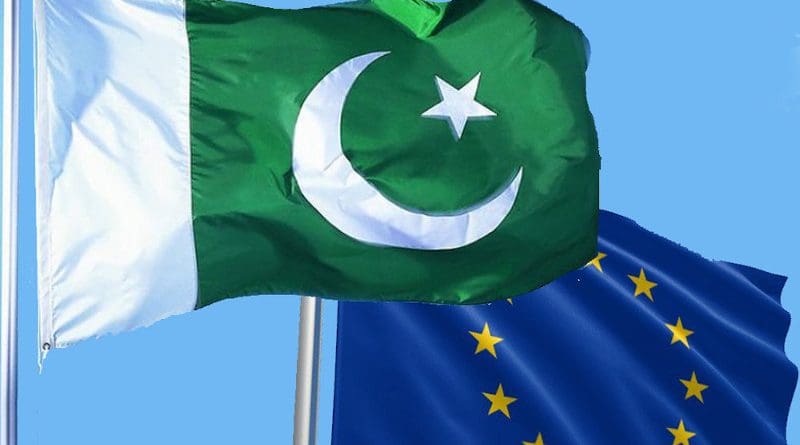Repercussions Of EU Trade Review Resolution On Pakistan – OpEd
Last week, The European Parliament adopted a resolution calling for a review of trade relations with Pakistan and ending its eligibility for the Generalized Scheme of Preferences (GSP) status. The unpresented resolution called for Pakistan to free a Christian couple which has been on death row since 2014 over blasphemy charges and urged the EU authorities to review the country’s GSP+ status amid “alarming” number of blasphemy cases.
The resolution also expressed concerns at increasing online and other attacks on journalists and human rights activists and asked Pakistan to take steps to ensure their safety. Responding to the resolution, Pakistan’s Foreign Office said, “The discourse in the European Parliament reflects a lack of understanding in the context of blasphemy laws and associated religious sensitivities in Pakistan – and in the wider Muslim world.” “The unwarranted commentary about Pakistan’s judicial system and domestic laws are regrettable,” he added.
The resolution came weeks after the government inked an agreement with the banned Tehreek-i-Labbaik Pakistan (TLP) group to end nearly weeklong protests and unrest. TLP’s protest not only kept the country besieged but it made international headlines as the religio-political group led massive anti-France demonstrations. This makes situation more complicated for already struggling foreign policy of Pakistan on multiple levels.
Ever since getting GSP status by the EU in 2014, Pakistan’s exports to EU increased 3.3 per cent; country’s exports to the EU went to $7.5 billion or 34 percent of total exports of the country after getting GSP Plus status. From 2013 to 2019, Pakistan was able to considerably enhance its exports to the EU with an increase of 65 per cent. The GSP plus facility is available to Pakistan till 2022 and a review by the EU is to take place in January 2022 to decide if this facility is to continue or not. As of now, Pakistani exports to the EU are dominated by textiles and clothing, accounting for 82 per cent of Pakistan’s total exports to the EU. Pakistani textile sector saw tremendous boom and was able to perform to the fullest capacity, after several years, when the Coronavirus pandemic hit the world forcing many countries to shut down their industries.
But Pakistan, unlike developed countries, relaxed lockdown restrictions early to ease pressure on industries and poor. That helped the country’s textile industry to receive orders from international markets when other countries were closed or were unable to meet deadlines. At one point Pakistan’s outbound shipments grew at a faster pace than Bangladesh and India as textiles, which account for half of the total export, led the recovery. But with the resolution, the country’s export may come under dark clouds of uncertainty and the export volume could get a major blow. The closure or cut on textile exports, therefore, would severely impact Pakistani economy and in turn a lot of people that are associated with the textile sector.
In recent past, Pakistan has also been struggling to uplift its soft image in the world mainly because some of the religious groups have targeted minorities continuously and mocked state laws by taking on streets with impunity. There have been repeated instances of minorities’ persecution in parts of Pakistan while the offenders either walked free because of the weak prosecution or remained at large amid patronage of powerful religious clerics. The influential TLP, which has huge fan base of middle class, has organized intermittent protests across the country and put forth its ridiculous demands to which the successive ruling governments have often complied since they were left with fewer options. It first staged a sit-in in Islamabad, famously known as Faizabad sit-in, in 2017 and left only after reaching an agreement with the then government.
Last year, the group partially besieged the capital to denounce the publication of blasphemous cartoons in a French magazine and forced the government to expel the French ambassador. The party announced ending sit-in after the ruling PTI government had accepted all its four demands. And last month, the PTI government inked another agreement with the TLP in which it was decided that the government would present the terms of an agreement signed between them last year in the parliament before April 20. Besides, the TLP actively participated in a recently held by-election in Karachi and came third despite the party is banned by the government.
It is fine to criticize EU’s resolution as it undermined several of the efforts that the state of Pakistan has undertaken towards safeguarding human rights and prosecuting violators. But it is also naive to reject it all together; minorities are still at high risk while the religious elements are way too influential in getting away from state laws. Pakistan’s economy is under lots of strains; it cannot afford to lose GSP plus status at this point when the GDP projections are just over 2 percent. The need of the hour is to initiate all out efforts to engage the EU so that Pakistan can enjoy the GSP plus status, at least till the time that was granted in the past. There is also a greater need to address home grown religious fundamentalism that is putting country’s foreign relations at stake. State should must ensure that its foreign policy is not high jacked by a group of religious radicals.
*The writer is a PhD scholar at the South Asian Center in Punjab University, Lahore. She tweets @AmeenaTanvir and can be reached at [email protected]


I’m totally agree with your words but what do you think what’s the solution? How can government control extremists? Making laws are easy but implementation is difficult in every corner of the country.